Microgrid-Powered ‘LawBox’ Helps Ugandan Town’s Residents Settle Cow, Contract, Boundary and Other Disputes
People often identify basic needs as food, shelter and water. But access to justice in developing countries is also important, said Ann Claire Williams, a retired U.S. Court of Appeals judge who now heads up Jones Day’s efforts to advance the rule of law in Africa.
In the town of Bala, Uganda, a solar microgrid is helping supply free legal services by providing free electricity to a “LawBox” and nearby buildings that would otherwise experience daily power outages and high diesel costs.
A place to find legal and mediation help
The LawBox is a partnership between Solar Electric Light Fund (SELF), which uses solar to address poverty and climate change, and BarefootLaw, a nonprofit that offers free legal services. It’s housed in a recycled shipping container that includes internet and computers and can help community members connect with lawyers for legal and mediation services. While the LawBox is staffed, many of the interactions with residents are via video communication with LawBox lawyers, said Robert Freling, SELF’s executive director.
“In developing countries, a lot of rights are violated, which creates legal issues,” Williams said. “They include ‘You stole my cows, your cow is grazing in my field’ and domestic violence.” Courts are backlogged, and the best way to resolve disputes is through mediation, she added.
Frequent power outages in Uganda undermine access to legal services
In Uganda, it’s common to lose power at least once a day, sometimes for hours. The villages often use polluting diesel backup power and struggle with acquiring the fuel for the generators.
Initially, BarefootLaw installed the LawBox without the solar or microgrid. To ensure the LawBox could have reliable power and serve as many Bala residents as possible, Williams introduced BarefootLaw to SELF.
The two organizations decided that providing power to a cluster of buildings, including the courts, town council, police station and community development office would help advance the rule of law, said Freling. The partnership resulted in an off-grid microgrid made up of 14.8 kW of photovoltaics and 64.8 kWh of battery storage. Transmission lines between the buildings were buried.
Solving long-standing legal disputes
The pro bono lawyers have solved disputes that have plagued the village for many years, Williams said.
For example, for 50 years, villagers in Bala had been involved in a dispute about boundary lines. BarefootLaw brought about 200 villagers together to work through their dispute.
“A number of disputes arise in undeveloped countries that often go unresolved. People have to understand their legal rights,” said Williams. For example, an employee might sign an agreement but get cheated because the employer doesn’t keep up their end of the deal.
“If you don’t understand the law and your rights, you will always be on the losing end,” she said.
Villagers in Bala now avoid being on the losing end, thanks to the solar microgrid’s ability to provide more reliable power to the LawBox and nearby public services.
Buildings served by microgrids within 1 km of each other
The two organizations were legally able to have the microgrid serve multiple buildings without any regulation because the buildings are all within 1 kilometer of each other, said Freling. But if they were farther apart and if they charged for power, the project would be regulated.
SELF paid for the project with funds raised from grants, he said. SELF also signed a maintenance contract with a local company to ensure the microgrid would be maintained. SELF and BarefootLaw are now looking at ways to generate income to cover the ongoing costs of the microgrid.
Like the LawBox project, other microgrid projects in Uganda are serving the public good. The ATLAS Containerized Microgrid medical clinic, which won the top 2021 Microgrid Knowledge Greater Good Award, serves South Sudanese refugees residing in Northern Uganda. Before the microgrid was installed, medical practitioners at the health clinic struggled with unreliable power and difficult access to clean water.
The health clinic now uses 22 linear feet of a 40-foot container, with the remaining 18 feet used for the microgrid and water purification systems. The 10-kW solar microgrid also provides power for medical staff housing and is capable of offering additional power for expanded water supply and area lighting.
Microgrids powering Uganda villages
Other microgrid projects in Uganda are bringing power to villages for the first time.
A pilot project, funded by a grant from The Rockefeller Foundation, demonstrated the benefits of solar providers partnering with a utility in Uganda to achieve electrification. Utility Umeme Uganda partnered with a renewable energy company and other organizations on a solar minigrid in Kiwumu, Uganda, that provides power to local businesses and about 300 homes. Developer Equatorial Power owns and operates the minigrid, and Umeme Uganda provides distribution assets — paid for by the grant — and a payment platform for customers.
In addition, London-based Winch Energy landed $16 million in funding, through a new financing platform, for solar minigrid projects in 49 villages in Uganda and Sierra Leone that will electrify villages there for the first time.
BarefootLaw helps boy return to school
The LawBox microgrid in Uganda is unique because it aims specifically to aid people seeking legal help. It has even served a boy who otherwise wouldn’t have had anywhere to turn, said Williams.
“A kid heard about the LawBox and how they settled things,” she said. The boy’s parents were divorced, and he wasn’t living with his father. The boy couldn’t go to school because his father wasn’t paying school fees, as promised. He turned to BarefootLaw’s LawBox for help.
“They invited the dad in and solved the problem,” she said.
The hope is to help many others solve disputes by deploying additional microgrid-powered LawBoxes, said Freling.
“We hope this will be a model replicated in Uganda and beyond,” he said.
Track microgrid projects around the world by subscribing to MGK's free newsletter










